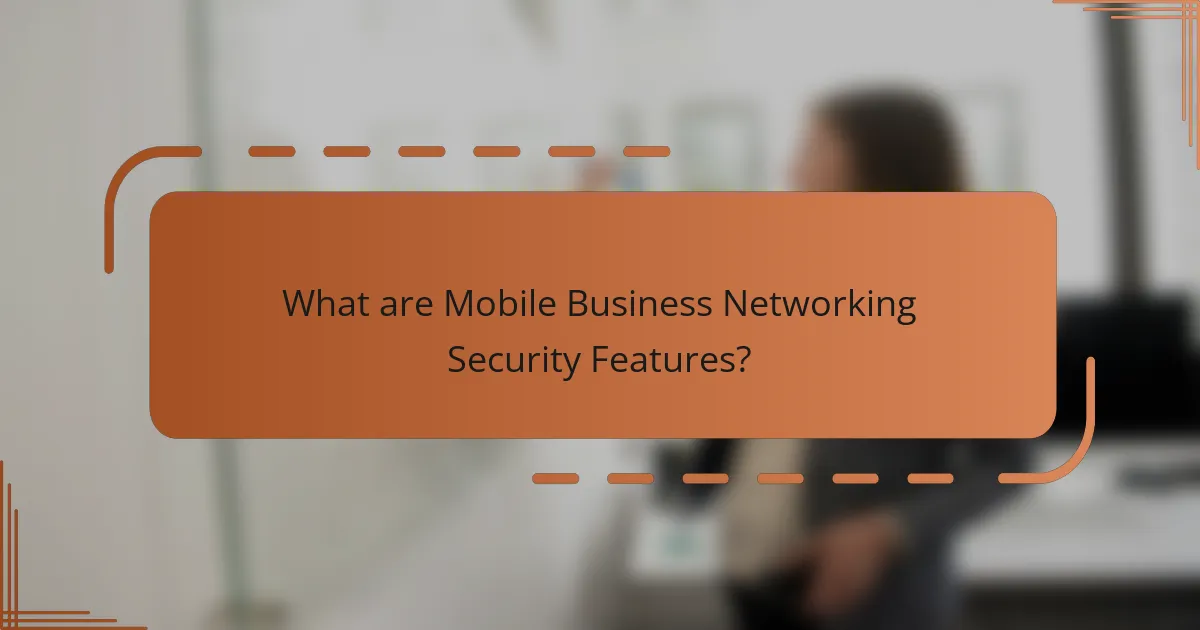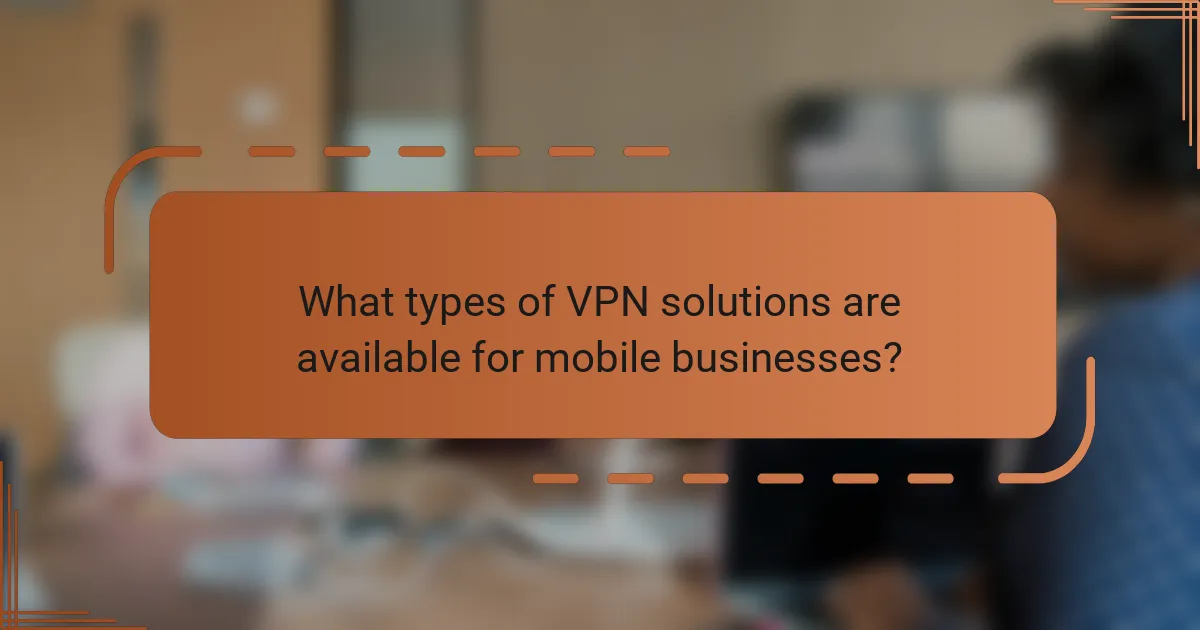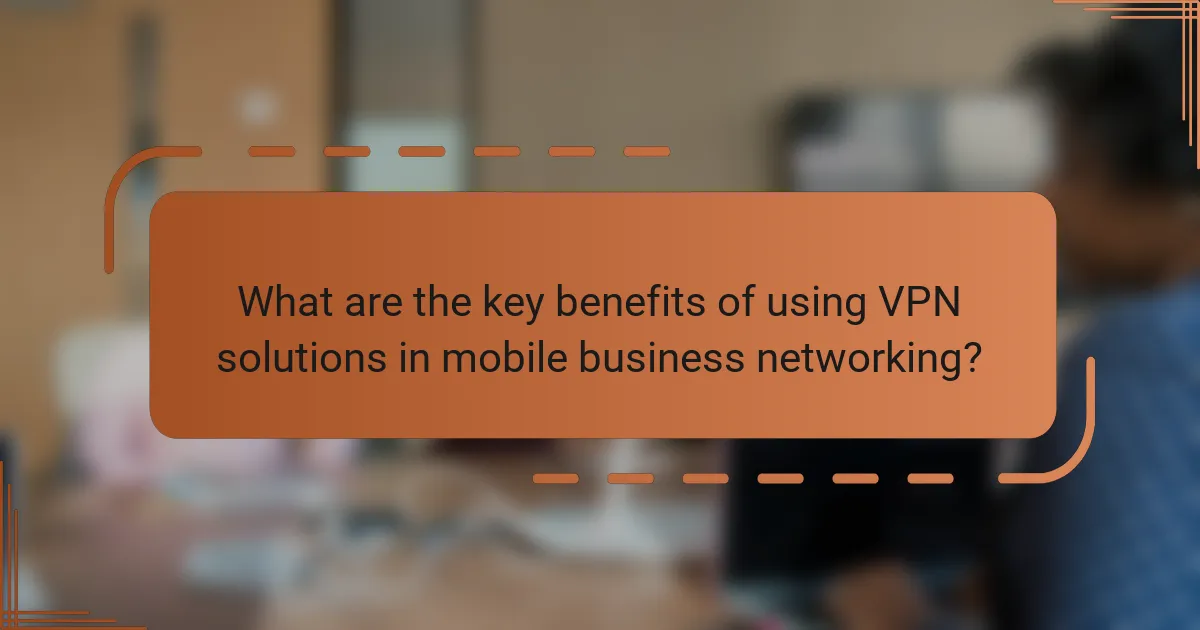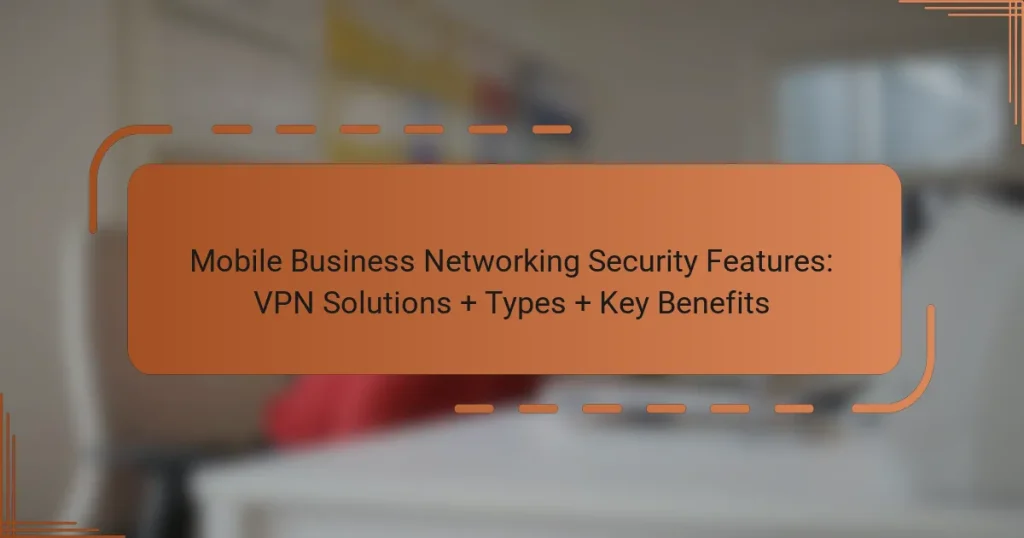Mobile business networking security features are essential for protecting sensitive information from cyber threats. Key components include encryption, authentication, and secure access controls, which collectively ensure data confidentiality and verify user identities. Various types of Virtual Private Network (VPN) solutions, such as remote access VPNs, site-to-site VPNs, and cloud VPNs, enhance security by encrypting data and providing secure access to networks and cloud services. These VPN solutions also mask IP addresses to protect user anonymity and enable access to region-restricted content. Understanding these security features and VPN types is crucial for mobile businesses to maintain secure and efficient operations.

What are Mobile Business Networking Security Features?
Mobile business networking security features include encryption, authentication, and secure access controls. Encryption protects data transmitted over networks, ensuring confidentiality. Authentication verifies user identities before granting access, preventing unauthorized use. Secure access controls limit network access to authorized devices and users only. These features collectively safeguard sensitive business information from cyber threats. For instance, according to the 2021 Verizon Data Breach Investigations Report, 61% of breaches involved credential theft, highlighting the importance of robust authentication measures.
How do these features enhance mobile business networking?
Mobile business networking security features enhance connectivity by ensuring data protection and privacy. Features like VPN solutions encrypt internet traffic, making it difficult for unauthorized users to access sensitive information. This encryption fosters trust among users, encouraging more frequent and open communication. Additionally, secure mobile access allows employees to connect from various locations without compromising data integrity. According to a report by Cybersecurity Ventures, businesses that implement strong security measures can reduce the risk of data breaches by up to 80%. Thus, these features are vital for maintaining secure and efficient mobile business networking.
What specific security threats do they address?
VPN solutions address specific security threats such as data interception, unauthorized access, and cyberattacks. They protect sensitive information transmitted over public networks. VPNs encrypt data, making it unreadable to potential eavesdroppers. This encryption safeguards against man-in-the-middle attacks. They also help prevent IP address tracking, enhancing user privacy. Additionally, VPNs can mitigate risks from unsecured Wi-Fi networks. By masking the user’s location, they reduce the likelihood of targeted attacks. Overall, VPNs provide a robust defense against various online security threats.
How do security features impact user experience?
Security features significantly influence user experience by enhancing trust and ensuring data protection. Users feel more secure when their data is encrypted and protected from unauthorized access. A study by the Ponemon Institute found that 63% of users prioritize security when choosing mobile apps. However, excessive security measures can lead to frustration, such as complex authentication processes. Balancing security and usability is crucial for maintaining a positive user experience. Effective security features should be seamless and not hinder functionality, as 70% of users abandon apps that are difficult to navigate. Overall, security features must create a safe environment while ensuring ease of use.
Why are VPN Solutions essential for mobile business networking?
VPN solutions are essential for mobile business networking because they provide secure and encrypted connections for remote users. This encryption protects sensitive data from interception, especially on public Wi-Fi networks. VPNs also enable employees to access company resources safely from any location. According to a report by Cybersecurity & Infrastructure Security Agency, 85% of data breaches involve human error, highlighting the need for secure connections. Furthermore, VPNs help maintain privacy by masking users’ IP addresses. This reduces the risk of targeted attacks on mobile devices. Overall, VPN solutions are critical for safeguarding mobile business communications and data integrity.
What is the role of a VPN in securing mobile connections?
A VPN encrypts data transmitted over mobile connections. This encryption protects sensitive information from unauthorized access. It creates a secure tunnel between the user’s device and the internet. By masking the user’s IP address, a VPN enhances privacy. It prevents third parties from tracking online activities. Additionally, a VPN can bypass geo-restrictions on content. Research indicates that VPNs reduce the risk of data breaches significantly. According to a study by Cybersecurity Ventures, VPN usage is projected to grow by 15% annually.
How do VPNs protect sensitive business data?
VPNs protect sensitive business data by encrypting internet traffic between devices and servers. Encryption transforms data into a coded format that is unreadable to unauthorized users. This ensures that even if data is intercepted, it remains secure. VPNs also mask the user’s IP address, making it difficult for hackers to trace online activities. They create a secure tunnel for data transmission, which protects against eavesdropping. Additionally, VPNs can prevent data leaks by blocking unsecured connections. According to a study by the Cybersecurity & Infrastructure Security Agency, using a VPN significantly reduces the risk of data breaches. This combination of encryption, IP masking, and secure tunneling makes VPNs a vital tool for safeguarding sensitive business information.

What types of VPN solutions are available for mobile businesses?
Mobile businesses can utilize several types of VPN solutions. The main types include remote access VPNs, site-to-site VPNs, and cloud VPNs. Remote access VPNs allow individual users to connect securely to a company’s network from anywhere. Site-to-site VPNs link entire networks, enabling secure communication between multiple business locations. Cloud VPNs provide secure access to cloud services while maintaining data privacy. Each type is designed to enhance security and facilitate remote work for mobile businesses.
What are the main categories of VPN solutions?
The main categories of VPN solutions include remote access VPNs, site-to-site VPNs, and mobile VPNs. Remote access VPNs allow individual users to connect securely to a private network from a remote location. Site-to-site VPNs connect entire networks to each other, facilitating secure communication between different office locations. Mobile VPNs are designed for mobile devices, providing secure connections even when the device is moving between different networks. Each category serves distinct purposes in enhancing network security and accessibility.
How does a remote access VPN differ from a site-to-site VPN?
A remote access VPN connects individual users to a private network over the internet. In contrast, a site-to-site VPN connects entire networks to each other. Remote access VPNs are typically used by remote employees to access company resources. Site-to-site VPNs are used to connect different office locations securely. Remote access VPNs require client software on the user’s device, while site-to-site VPNs require a VPN gateway at each location. This distinction allows remote access VPNs to provide flexibility for individual users, whereas site-to-site VPNs offer a stable connection between fixed locations.
What are the unique attributes of each VPN type?
Remote Access VPNs provide individual users with secure access to a private network. They allow users to connect to the network from any location. This type is ideal for remote workers needing access to internal resources. Site-to-Site VPNs connect entire networks to each other securely. They facilitate communication between multiple offices or branches. This type is commonly used by organizations with multiple locations.
SSL VPNs use Secure Sockets Layer technology for secure remote access. They operate through a web browser, making them user-friendly. This type is effective for accessing specific applications rather than the entire network. IPSec VPNs encrypt data at the IP level, ensuring secure communication over the internet. They are widely used for site-to-site connections. This type is favored for its robust security features.
PPTP VPNs are known for their speed and ease of setup. They are less secure compared to other types but offer quick connections. This type is suitable for users prioritizing speed over security. L2TP VPNs combine the features of PPTP and IPSec for better security. They provide a balance between speed and security, making them versatile. Each VPN type has distinct attributes that cater to different networking needs.
What factors should businesses consider when choosing a VPN?
Businesses should consider security, speed, compatibility, and cost when choosing a VPN. Security is paramount; a VPN should use strong encryption protocols like OpenVPN or IKEv2. Speed impacts user experience; faster VPNs enhance productivity. Compatibility with devices and operating systems is essential for seamless integration. Cost must align with the budget while ensuring adequate features. Additionally, customer support availability can be critical for troubleshooting. Reviews and performance benchmarks can provide insights into reliability and user satisfaction.
How do security protocols affect VPN selection?
Security protocols significantly influence VPN selection. Different protocols offer varying levels of encryption, authentication, and performance. Common protocols include OpenVPN, L2TP/IPsec, and IKEv2. OpenVPN is widely regarded for its strong security and flexibility. L2TP/IPsec combines L2TP with IPsec for enhanced security but may be slower. IKEv2 is known for its speed and ability to reconnect quickly. The choice of protocol affects data protection and speed, impacting user experience. Selecting a VPN with the appropriate security protocol is crucial for maintaining data confidentiality and integrity.
What considerations are there for scalability and performance?
Scalability and performance are crucial factors for VPN solutions in mobile business networking. Scalability refers to the ability of the VPN to handle increased loads without performance degradation. Performance encompasses speed, latency, and reliability of the VPN connection.
Factors affecting scalability include the architecture of the VPN, such as whether it is centralized or decentralized. A decentralized architecture often provides better scalability as it distributes the load across multiple servers.
Performance can be influenced by encryption protocols used. For example, protocols like OpenVPN may offer strong security but can introduce latency. In contrast, IKEv2/IPsec typically provides faster connections with lower latency.
Network bandwidth is another consideration. Sufficient bandwidth is necessary to maintain performance as the number of users increases.
Load balancing techniques can enhance both scalability and performance. These techniques distribute user connections across multiple servers to avoid bottlenecks.
Regular performance monitoring ensures that the VPN meets the required standards as the network grows. This monitoring helps identify potential issues before they impact users.
In summary, scalability and performance considerations for VPN solutions include architecture, encryption protocols, bandwidth, load balancing, and performance monitoring.

What are the key benefits of using VPN solutions in mobile business networking?
VPN solutions enhance mobile business networking by providing security, privacy, and access. They encrypt data transmitted over public networks. This encryption protects sensitive information from unauthorized access. VPNs also mask the user’s IP address, enhancing anonymity online. By doing so, they prevent tracking and data collection by third parties. Additionally, VPNs allow access to region-restricted content and resources. This capability is essential for remote teams needing specific tools or information. In summary, VPN solutions are vital for secure, private, and unrestricted mobile business networking.
How does a VPN enhance data privacy for mobile users?
A VPN enhances data privacy for mobile users by encrypting their internet traffic. This encryption prevents unauthorized access to sensitive information. When mobile users connect to a VPN, their data is routed through a secure server. This masks their IP address and location, making online activities harder to trace. Additionally, VPNs protect against potential threats on public Wi-Fi networks. According to a study by Cybersecurity & Infrastructure Security Agency, using a VPN significantly reduces the risk of data breaches. Thus, VPNs are essential for maintaining privacy and security for mobile users.
What encryption methods do VPNs use to protect data?
VPNs use several encryption methods to protect data, including AES, IPSec, and SSL/TLS. AES (Advanced Encryption Standard) is the most widely used encryption algorithm, providing strong security with key lengths of 128, 192, or 256 bits. IPSec (Internet Protocol Security) encrypts data at the network layer, ensuring secure communication between devices. SSL/TLS (Secure Sockets Layer/Transport Layer Security) encrypts data at the transport layer, commonly used for secure web browsing. These methods ensure confidentiality, integrity, and authentication of data transmitted over the internet. The use of strong encryption methods is critical for safeguarding sensitive information from unauthorized access.
How does a VPN prevent unauthorized access to business networks?
A VPN prevents unauthorized access to business networks by encrypting data transmitted over the internet. This encryption secures sensitive information from interception by unauthorized users. It creates a secure tunnel between the user’s device and the business network. This tunnel masks the user’s IP address, making it difficult for attackers to identify their location. Additionally, VPNs often employ authentication protocols to verify user identity before granting access. This ensures that only authorized personnel can connect to the network. According to a report by Cybersecurity Ventures, 60% of businesses experienced a cyberattack in the past year, highlighting the importance of VPNs in protecting against such threats.
What cost savings can businesses expect from implementing VPN solutions?
Businesses can expect significant cost savings from implementing VPN solutions. VPNs reduce the need for expensive dedicated lines and infrastructure. They enable remote work, decreasing office space costs. VPNs also lower travel expenses by facilitating virtual meetings. Additionally, VPNs enhance security, reducing potential costs from data breaches. According to a report by Global Market Insights, companies can save up to 30% on operational costs with VPNs. These savings stem from increased efficiency and reduced risk.
How do VPNs reduce the risk of data breaches and associated costs?
VPNs reduce the risk of data breaches by encrypting internet traffic. This encryption protects sensitive data from unauthorized access during transmission. VPNs also mask the user’s IP address, making it harder for attackers to target specific devices. Additionally, they provide secure remote access to company networks, reducing vulnerabilities associated with public Wi-Fi. According to a study by Cybersecurity Ventures, businesses can save up to $3.86 million on average for each data breach avoided. By implementing VPNs, organizations can significantly mitigate potential financial losses linked to data breaches.
What are the long-term financial benefits of using VPN technology?
Using VPN technology can lead to significant long-term financial benefits for businesses. Firstly, VPNs reduce operational costs by enabling remote work, eliminating the need for physical office space. A study by Global Workplace Analytics indicates that companies can save an average of $11,000 per year for each employee working remotely.
Secondly, VPNs enhance data security, reducing the risk of costly data breaches. According to IBM, the average cost of a data breach in 2023 is $4.45 million. By securing sensitive information, businesses can avoid these expenses and potential legal fees.
Additionally, VPNs allow access to global markets and services, providing opportunities for cost-effective solutions and competitive pricing. This can lead to increased revenue through expanded customer bases.
Lastly, VPNs can decrease costs associated with internet service providers by allowing businesses to bypass regional pricing differences. This flexibility can result in lower operational expenses over time.
What best practices should businesses follow when implementing VPN solutions?
Businesses should follow several best practices when implementing VPN solutions. First, they should choose a reliable VPN provider with a strong reputation for security. This ensures data protection and minimizes risks. Second, businesses must ensure that all employees are trained on how to use the VPN effectively. Proper training reduces the likelihood of human error leading to security breaches. Third, they should implement multi-factor authentication for VPN access. This adds an extra layer of security beyond just passwords. Fourth, businesses should regularly update their VPN software to patch vulnerabilities. Regular updates help protect against emerging threats. Fifth, they should monitor VPN usage and logs for unusual activity. This helps identify potential security incidents early. Lastly, businesses should establish a clear VPN policy outlining acceptable use. A well-defined policy guides employee behavior and ensures compliance with security protocols.
How can businesses ensure user compliance with VPN policies?
Businesses can ensure user compliance with VPN policies through clear communication and training. Educating employees about the importance of VPN usage helps foster understanding. Regular training sessions can reinforce the policies and expectations. Implementing technical controls, such as mandatory VPN connections for remote access, ensures compliance. Monitoring user activity can also help identify non-compliance issues. Providing support and resources for troubleshooting encourages proper usage. Additionally, enforcing consequences for policy violations can deter non-compliance. Overall, a combination of education, monitoring, and enforcement creates a robust compliance framework.
What common troubleshooting tips can enhance VPN performance?
To enhance VPN performance, users can follow several common troubleshooting tips. First, check the internet connection speed. A slow connection can hinder VPN performance. Next, switch to a different server location. Some servers may be overloaded, impacting speed. Users should also ensure that the VPN software is up to date. Updates often include performance improvements and bug fixes. Additionally, disabling unnecessary background applications can free up bandwidth for the VPN. Users can also try changing the VPN protocol. Different protocols can offer varying levels of speed and security. Finally, consider using a wired connection instead of Wi-Fi. Wired connections typically provide more stable performance.
Mobile business networking security features encompass essential elements such as encryption, authentication, and secure access controls, with VPN solutions playing a critical role in safeguarding sensitive information. This article outlines how these features enhance connectivity, address specific security threats, and impact user experience, while also detailing various types of VPN solutions available for mobile businesses. Additionally, it discusses the key benefits of implementing VPN technology, including cost savings, data privacy, and long-term financial advantages. Best practices for effective VPN implementation and user compliance are also highlighted, providing a comprehensive overview of mobile business networking security.


